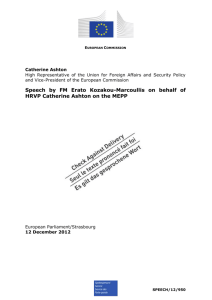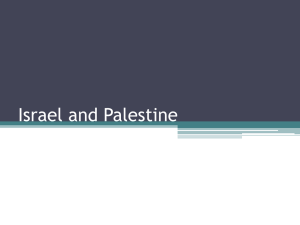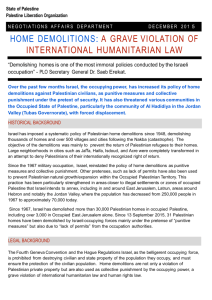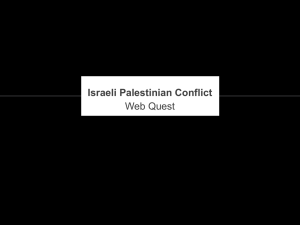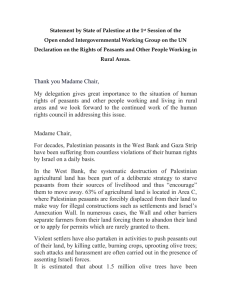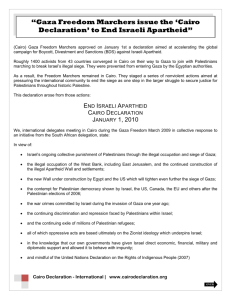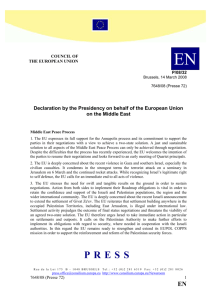Palestinian women hard hit by Israeli occupation
advertisement
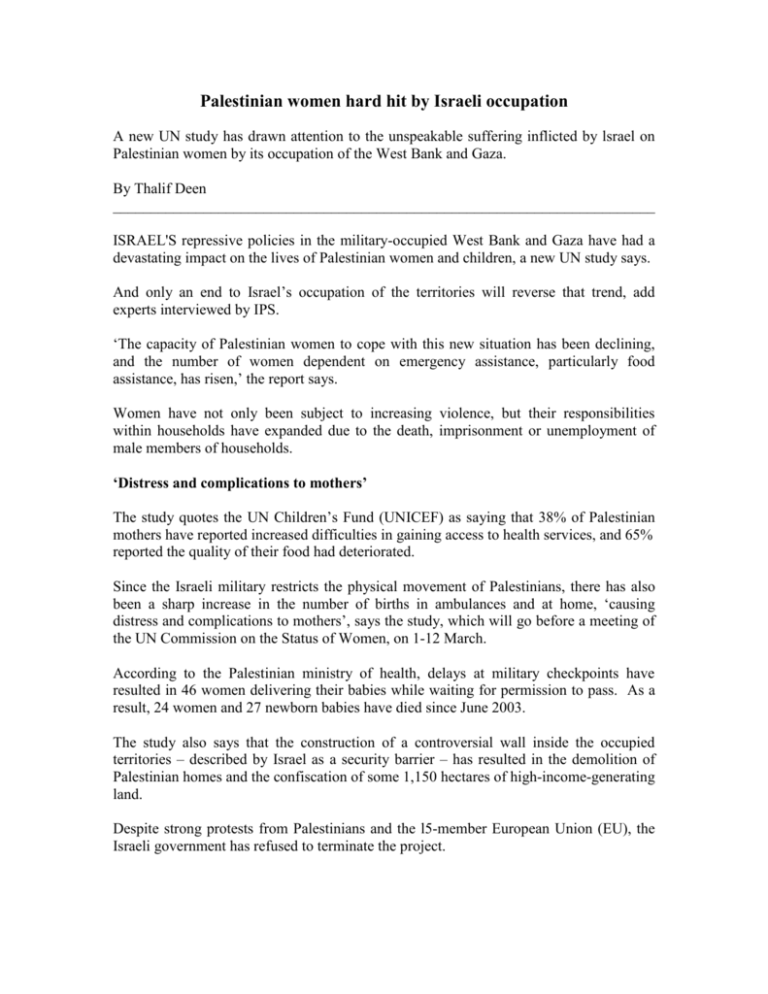
Palestinian women hard hit by Israeli occupation A new UN study has drawn attention to the unspeakable suffering inflicted by lsrael on Palestinian women by its occupation of the West Bank and Gaza. By Thalif Deen ________________________________________________________________________ ISRAEL'S repressive policies in the military-occupied West Bank and Gaza have had a devastating impact on the lives of Palestinian women and children, a new UN study says. And only an end to Israel’s occupation of the territories will reverse that trend, add experts interviewed by IPS. ‘The capacity of Palestinian women to cope with this new situation has been declining, and the number of women dependent on emergency assistance, particularly food assistance, has risen,’ the report says. Women have not only been subject to increasing violence, but their responsibilities within households have expanded due to the death, imprisonment or unemployment of male members of households. ‘Distress and complications to mothers’ The study quotes the UN Children’s Fund (UNICEF) as saying that 38% of Palestinian mothers have reported increased difficulties in gaining access to health services, and 65% reported the quality of their food had deteriorated. Since the Israeli military restricts the physical movement of Palestinians, there has also been a sharp increase in the number of births in ambulances and at home, ‘causing distress and complications to mothers’, says the study, which will go before a meeting of the UN Commission on the Status of Women, on 1-12 March. According to the Palestinian ministry of health, delays at military checkpoints have resulted in 46 women delivering their babies while waiting for permission to pass. As a result, 24 women and 27 newborn babies have died since June 2003. The study also says that the construction of a controversial wall inside the occupied territories – described by Israel as a security barrier – has resulted in the demolition of Palestinian homes and the confiscation of some 1,150 hectares of high-income-generating land. Despite strong protests from Palestinians and the l5-member European Union (EU), the Israeli government has refused to terminate the project. In December, the UN General Assembly adopted a resolution seeking an advisory opinion on the legality of the security wall from the International Court of Justice (ICJ). The court’s public hearings are scheduled for 23 February in The Hague. Since the Palestinian uprising began in September 2000, over 2,600 Palestinians and more than 825 Israelis have been killed in the ongoing violence. The continued Israeli repression and the targeted assassinations of Palestinian leaders have, in turn, triggered a rash of suicide bombings against Israelis. ‘Foreign governments need to press these issues with Israel,’ John Quigley, professor of law at Ohio State University, told IPS. The EU in particular, he argued, is well positioned to bring about changes in Israeli policies because the country depends on the European market to sell its products. ‘The United Nations can use its moral authority on the issue, and can mobilise collective action by member states. The United States is well positioned because of the financial aid it gives Israel,’ Quigley added. Israel is the largest recipient of US aid, worth more than $3 billion annually. Much of the suffering of Palestinian women happens beyond the international media spotlight on violence in the territories, said Quigley. ‘Instances of use of armed force gain media attention, but what does not get attention is the living conditions that are the result of the totality of Israeli policy in Gaza and the West Bank,’ added the author of Genocide in Cambodia and Palestine and Israel. He said hardships of daily life, felt most acutely by Palestinian women, have been severe during the Israeli occupation going back to the 1960s, but they have worsened in the past two years. ‘These hardships are not simply side effects of Israeli actions. Israel’s policies in Gaza and the West Bank through the entire period of the occupation have spurred an outflow of population, since Palestinians are unable to make ends meet, unable to pursue their professions, unable to live a normal life,' he added. The Palestinian economy has continued to accumulate losses, currently equal to one-half its annual gross domestic product (GDP). By March 2003, the number of poor had tripled from 637,000 in September 2000 to nearly two million, and more than 50% of the Palestinian workforce was unemployed, according to the World Bank. But women and children continue to bear ‘a special and enduring burden’ from the military occupation, the UN study said. 2 Need for concrete action Such reports on the situation of Palestinian women can help the international community better understand the vast ways in which Israel’s occupation negatively affects and impedes the development of all sectors of Palestinian society, says Catherine Cook, senior analyst and media coordinator for the Middle East Research and Information Proiect (MERIP). ‘But such information in and of itself will do little to improve the plight of these women,’ said Cook, who lived in the Israeli-occupied town of Ramallah from 1999-2002, and is co-author of A Road Map to the Oslo Cul-de-Sac. ‘Over the past three years, there have been tens of reports outlining the devastating impact Israel's occupation policies have on civilians, including women and children, on the economy, on social and cultural life, civil society and Palestinian institutions,’ she added. But none of these sectors will improve until the policies that have generated such horrific conditions are ended – ‘and that requires an end to Israel's occupation’, Cook told IPS. ‘What is desperately needed now is for the international community to move beyond simply reporting, and towards taking concrete action designed to pressure Israel to abide by its obligations under international law,’ she added. A Middle East ‘road map’ to peace, which initially had the backing of the United States, has also been shelved because of Israeli intransigence. Its rejection has been accompanied by intense restrictions on the movement of Palestinians, including road closures, curfews and the multiplication of checkpoints. ‘In some cases, women were injured near or inside their houses when attempting to cross checkpoints in the course of going to work or seeking employment,’ the report said. The study reveals the extent to which women's living conditions have drastically deteriorated under the draconian measures applied by the government of Israeli Prime Minister Ariel Sharon, said Naseer Aruri, professor emeritus of political science at the University of Massachusetts. The crimes committed against Palestinian women and other civilians have been neglected by global civil society, added Aruri, author of The Obstruction of Peace: the US, Israel and the Palestinians. These crimes, he added, continue to be committed under a protective umbrella provided by the administration of US President George W Bush, which bears legal and moral responsibility to provide international protection to the occupied rather than the occupier. 3 ‘Such wanton acts by the Israelis designed to destroy indigenous Palestinian society can only be checked by an increasing role for the United Nations in the so-called Middle East Peace process,’ Aruri told IPS. But, he warned, ‘as long as the United States continues to be the self-styled peacemaker, Israel's bankroller, chief diplomatic backer and arms supplier, there will be neither peace nor security for the innocent Palestinian civilians, including women and children’. – IPS Third World Resurgence No. 163/164, March/April 2004 4



